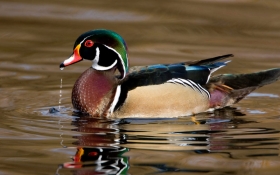
North American Wood Duck
Aix sponsa
Animal Behavior: Wood ducks occupy a wide variety of habitats including woodland areas along lakes, rivers, creeks, beaver and farm ponds and various other freshwater vegetated wetland areas. Because wood ducks are cavity nesters, the availability of nesting sites within one mile of water is necessary. Winter habitats are the same as those used during breeding.
Native Habitat: North America
Eating Habits: Wood ducks are omnivores. They feed on nuts, fruits, aquatic plants and seeds, aquatic insects and other invertebrates. The majority of their food includes acorns, hickory nuts, maple seeds, smart weeds, Diptera (true flies), Lepidoptera (butterflies and moths), Hemiptera (true bugs), Coleoptera (beetles), Isopoda (pillbugs and sowbugs), Decapoda (shrimp, crabs, and relatives), Trichoptera (caddisflies), Hymenoptera (wasps, bees, and ants), Odonata (dragonflies and damselflies), and Gastropoda (gastropods, slugs, snails).
Conservation Efforts: As a result of hunting and habitat destruction A. sponsa was near extinction in the early nineteen hundreds. Today, despite the fact that they are hunted, their population is thriving. Hunting laws have been put into place to protect them.
Animal Facts: Aix sponsa shows courtship behaviors in the fall and again in the spring. Male wood ducks are serially monogamous (they stay with one female for one breeding season but mate with a different female the next year). Females lay 6 to 15 eggs. It is not uncommon for a nest to have more than 15 eggs because at times other females will lay their eggs in the nests (a behavior called egg-dumping). The average lifespan of A. sponsa is three or four years. The maximum recorded lifespan in the wild is roughly 15 years.
